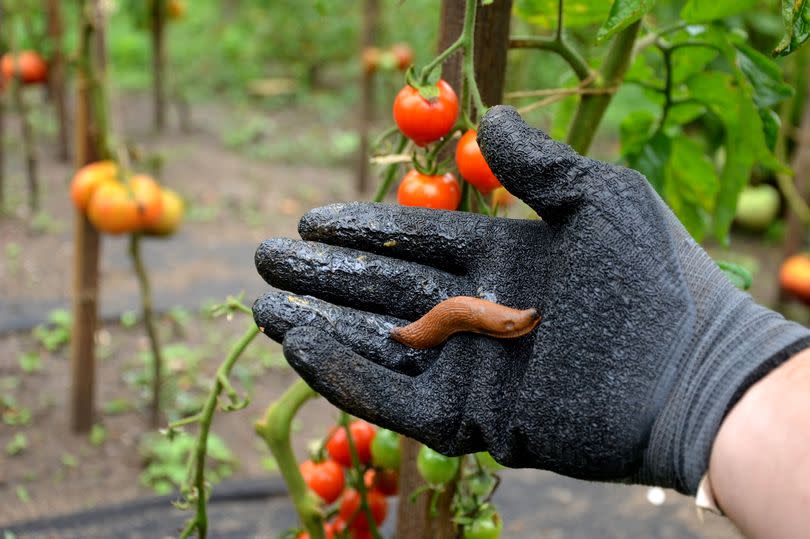Effective 4-ingredient spray to get rid of slugs from your garden

Gardens may be looking at their best currently, with flowers blooming and crops ready to be picked - providing you can keep slugs and other garden pests away from them. Never fear, Nancy Birtwhistle, a household expert best known for winning the Great British Bake Off, has shared there is an easy homemade remedy to keep these slimy nuances away from your garden for good, according to the Express.
She said: “Even the keenest eyes can oversee bugs and pests and if left untreated can soon damage your favourite roses, shrubs and veggies. I have spent time reading and trying various natural bug treatments over the past two years. Some potions had no effect whatsoever and after much trying and failing, trying and failing I consider the following two recipes to be effective.”
How to keep pests away from your flowers
You will need:
500g of rhubarb leaves (not the stalks)
One litre of cold water
20 drops of clove bud oil
One or two drops of eco-friendly washing-up liquid
Rhubarb leaves contain oxalic acid which is toxic to not just slugs but also aphids, caterpillars, mites and flies which will all keep away from your flowers. Cut the rhubarb leaves into sheds with scissors, then pour one litre of cold water into a saucepan, add the leaves, and then simmer for 30 minutes.
Get the latest news straight to your phone by joining us on WhatsApp
Leave the water to cool in the pan and then strain and add the mixture to a large spray bottle. Add one or two drops of washing-up liquid and 20 drops of clove buds oil, then shake well before use and spray around your flowers.
However, it should be noted that oxalic acid is toxic which is why it should not be used on crops and should not used if you own pets, but there is another alternative homemade spray you can use.
Nancy said: “This spray contains oxalic acid which is a poison and for that reason, I will not be using it on my edibles – fruit, vegetables etc. Add the boiled leaves to the compost heap.”
How to keep pests away from your vegetable and fruit crops:
You will need
60g of nettles
600ml of cold water
Six drops of clove bud spray
One or two drops of eco-friendly washing-up liquid
Make sure to wear gardening gloves as you will need to cut any nettle weeds in your garden with scissors. Cut the nettles into two or three inches and then place them in a large pan or bowl with a lid and pour over 600ml of cold water.
Stir the mixture and make sure the nettles are completely submerged in the water, then place the lid on and leave the mixture outside in your garden. Forget about the mixture for at least a week but it is better to wait two weeks, then take off the lid, stir the mixture and strain it.
It should be noted that this nettle homemade repellent will smell “really awful” according to Nancy which is why it works so well to stop pests from eating your plants. However, be prepared for the smell when you open the lid. It may be best to wear gardening gloves and an apron to make sure the liquid does not get on your clothes.
Place the liquid in a spray bottle and add two drops of eco-friendly washing-up liquid and six drops of clove bud oil, then give it a good shake and spray.
Nancy said: “This spray I will use on my vegetables as it not only kills aphids, the clove bud oil will deter insects, the washing up liquid helps it to stick to the leaves and not run straight off and the foul-smelling nettle water is adored by plants and will give them a welcome liquid feed.
“I would not harvest any vegetables until two days after spraying and wash well.”
Make sure to only spray both of these homemade repellants in the evening as spraying during the day could harm pollinating insects that are active in the daytime such as bumblebees.
Nancy added: "Always spray after the sun has gone down, when the weather is still and dry. Never spray during the day when our important flying insects – bees, wasps, butterflies, ladybirds etc are out doing their best."
Get the latest breaking news and top stories from Nottinghamshire in our daily newsletter

 Yahoo News
Yahoo News 
